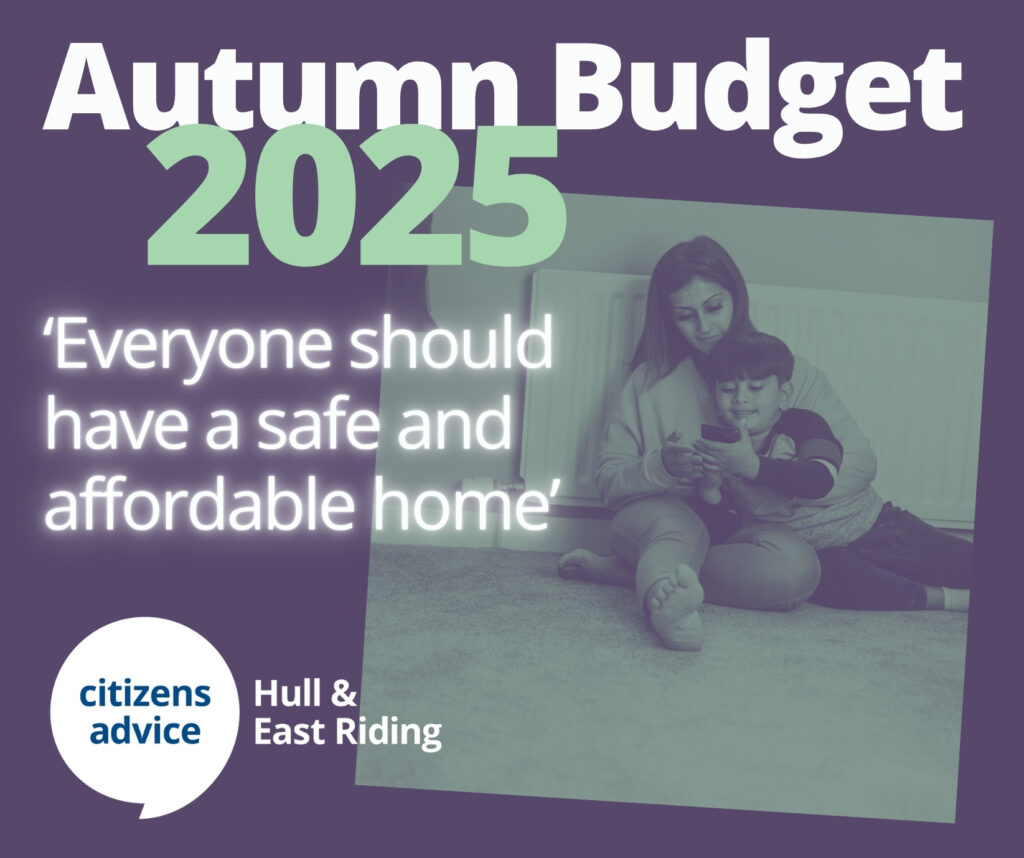Autumn Budget 2025: Safe and affordable housing
In the run-up to the Autumn Budget on November 26th, Citizens Advice has three key asks for the Chancellor – vital changes that would help prevent hardship and protect the most vulnerable in our communities. Each week, we’re sharing a blog that explains one of these asks and why it matters for the people we support in Hull and the East Riding of Yorkshire. This week, we are focusing on housing – because without a safe and affordable home, everything else becomes harder.
One of our key budget requests is to uprate the Local Housing Allowance (LHA) so it reflects the 30th percentile of local market rents.

This might sound technical, but it has a very real impact on people’s lives.
What is Local Housing Allowance?
Local Housing Allowance is the maximum support people can receive towards private rented housing when they claim Housing Benefit or the housing element of Universal Credit. It’s designed to cover the cost of the bottom 30% of the local rental market – so that people on lower incomes can still find a suitable home in their community.
However, support has not kept up with rent. Private rents across Hull and the East Riding have risen sharply over recent years. But the LHA has been frozen, even as rents increased month by month.
This means the support people receive often falls far short of what landlords are charging.
Our advisers regularly support people who are:
- Falling into rent arrears
- Cutting back on essentials to keep their home
- Forced to move away from schools, jobs, and support networks
- Unable to secure a first tenancy due to unaffordable gaps in rent
Families facing impossible choices
When that support does not match real-world costs, families are left making impossible choices. Currently the average cost for a two-bedroom property in Hull is £578 a month, increasing to £691 for a three-bedroom. In the East Riding, this averages at £621 for a two-bedroom & £764 for a three-bedroom. In contrast, prior to the COVID pandemic, these rents were between £450 and £550 depending on the authority and property size.
We are seeing the real consequences:
- More people facing eviction
- Increased use of expensive temporary accommodation
- Parents skipping meals for their children can eat
- Young people unable to move into independent living
Our advisers are seeing these consequences on a daily basis with our clients.
One client came to us for help applying for a Discretionary Housing Payment because their housing support falls £95 short every month. To keep a roof over their head, they have had to turn to food banks.
Another client told us that the LHA rate in their area does not come close to covering their rent, leaving them constantly juggling bills and falling further behind.
Many clients are reporting increasing financial strain as they try to make up the difference between their entitlement and what landlords are charging.
One person was facing homelessness and asked for help finding somewhere affordable. When our adviser looked at every property within the Hull and East Riding Broad Rental Market Area, only four were available at or below the shared accommodation rate.
A family living in a three-bedroom home is experiencing exceptional hardship because their support falls £200 short each month. They are desperately trying to find a more affordable property, but nothing suitable is available within their LHA rate – forcing them to use disability benefits to plug the gap.
The safety net is no longer holding people up – it’s letting them fall through.
Uprating the LHA matters. Restoring the LHA to the 30th percentile of rents would:
- Prevent homelessness
- Support people to remain in their communities
- Reduce pressure on emergency housing services
- Help ensure homes are safe, suitable, and affordable
It’s a cost-effective and essential part of a functioning welfare state. Uprating Local Housing Allowance is a crucial step in ensuring everyone has a secure place to call home.
